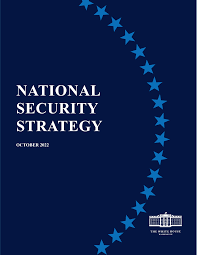
It is an eventful several weeks. Most dramatically the 20th Party Congress of the Chinese Communist Party has launched – indeed it is approaching its conclusion. There is little doubt that Xi Jinping will claim a third term ending the effort by earlier leaders to limit leadership to two terms. His statements will likely be our best guide to Chinese foreign policy for the immediate future. But more on that in a future blog post.
And then there’s the Biden Administration’s release of the National Security Strategy (NSS). The NSS explains the security priorities of the administration to both Congress and the American public and is a legislatively mandated document.This strategic document was about to be released in February of this year but was delayed as the Russia-Ukraine war loomed. With its release just a few days ago, we get some big picture framing for Biden Administration security and foreign policy. Indeed, the advance press call held by Jake Sullivan, the United States National Security Advisor to President Joe Biden, on the day of the document’s release provides an interesting summary and insight of current US policy. Jake sets it out:
The fundamental premise of the strategy is that we have entered a decisive decade with respect to two fundamental strategic challenges. The first is the competition between the major powers to shape the future of the international order. And the second is that while this competition is underway, we need to deal with a set of transnational challenges that are affecting people everywhere, including here in the United States — from climate change to food insecurity, to communicable diseases, to terrorism, to the energy transition, to inflation.
And this strategy makes clear that these shared challenges are not marginal issues, they are not secondary to geopolitics, but they operate on a plane alongside the competition — the geopolitical competition with major powers.
Now, of course, there are tensions between trying to rally cooperation to solve these shared challenges and trying to position ourselves effectively to prevail in strategic competition. But there are also ways in which these are reinforcing. And we believe fundamentally that the core elements of what the United States must do in the years ahead is — are the same for both sets of challenges.
Specifically, we need to invest in the underlying sources and tools of American power and influence, especially our strength here at home, both for the purpose of effective competition and for the purpose of being set up to rally the world to solve shared challenges.
Second, we need to build the strongest possible coalition of nations to enhance our collective influence, both to shape the global strategic environment and to address these transnational threats that require cooperation to succeed. And finally, we need to set the rules of the road for the 21st century in critical areas — from emerging technologies in cyberspace, to trade, economics, investment, and more — both so that the international order continues to reflect our values and our interests and so that the international order is better designed to be able to take on the challenges ahead.
So this decisive decade is critical both for defining the terms of competition, particularly with the PRC, and for getting ahead of massive challenges that if we lose the time in this decade, we will not be able to keep pace with most notably the climate crisis, but other challenges as well.
